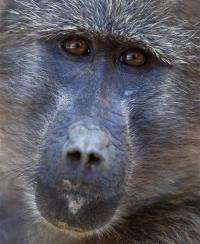In this photo taken March 19, 2010, a baboon looks on at Constantia Uitsig wine estate near Cape Town, South Africa. South African farmer Alwyn van der Merwe, is thanking voracious baboons for what could be a lucrative discovery: a sweeter tangerine he can get to market faster. The discovery of the natural mutation citrus tree was made when baboons would strip one tree in an orchard before others. (AP Photo/Schalk van Zuydam-File)
(AP) -- When it comes to grabbing fruit off trees, baboons don't monkey around. Now their speed at gobbling up quickly ripening fruit has led to a discovery of what is believed to be a new type of tangerine.
South African farmer Alwyn van der Merwe said workers noticed several years ago that one of his tangerine trees was already stripped of fruit when the other trees were ready for picking. The same thing happened the next year, and the next. A farmworker finally solved the mystery when he saw baboons picking the tree clean. This one tree was making ripe tangerines three to four weeks ahead of all the others.
Van der Merwe said tests showed the fruit is sweeter and ripens faster. He produced more of the trees using grafts. His ALG Estates, a family citrus business north of Cape Town, will soon be exporting the tangerines, van der Merwe said.
"There is a big market in the U.S.," he noted. "Especially when you're earlier."
Getting to market before other suppliers means higher prices can be charged.
Justin Chadwick, head of South Africa's Citrus Growers Association, said experts are constantly trying to develop varieties in laboratories that ripen either earlier or later than normal.
Van der Merwe believes his tree naturally mutated, something that Chadwick said does occur and that farmers should keep an eye out for. Van der Merwe may be bagging extra profits but recognizes he had help.
"The baboons were right," the farmer said.
Van der Merwe said he might give the baboons credit when he names his new variety.
At the very least, he said, he'll leave them a crate of the tangerines next harvest.
©2010 The Associated Press. All rights reserved. This material may not be published, broadcast, rewritten or redistributed.




















